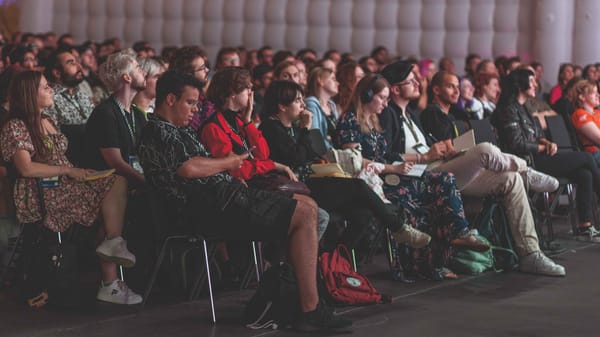Light at the End of the Tunnel – but Still Quite Far Away




Prof Dr Malte Behrmann has been attending industry events around the world for many years. He is a highly active political and industry figure. For GamesMarkt, he summarises his personal experience of this year’s devcom. The text first appeared in issue 465 of GamesMarkt.
Devcom 24 were two rich and colourful days in the brand new Confex Conference centre at the outset of the gamescom in Cologne. Some drew similarities between the Confex centre and the Moscone centre in San Francisco, which might have inspired the architect. New as well: Slightly more tolerance towards non-vegetarians — but it‘s not because of the food you choose to go to devcom.
As last year, I write a subjective review about interesting and new things I encountered. The global game development industry is still suffering from the post-covid crisis. It is undergoing a profound transformation, driven by shifting business models, evolving investment strategies, and the increasing influence of new trends like labour movements. At devcom, a gathering of industry leaders and experts, these changes were dissected and analysed. See my key takeaways from devcom, offering insights into the future of game development. The Personal Nature of Business in Game Development: In his very personal talk "Talking the walk — 10 Steps to stay relevant in today‘s competitive industry", Martin Coo aptly noted that business remains deeply personal.
Success in the game industry is built on relationships and trust—trust in people, products, and the quality they deliver. Quality, however, is not solely defined by developers or publishers; it is a dynamic concept that hinges on what is delivered to the consumer and the value they perceive. This underscores the importance of maintaining high standards, not just in product development but also in customer engagement and support.
“Navigating the Crisis”: Investor expectations and market realities were addressed at a roundtable discussion led by Pawel Rohleder. It highlighted the ongoing crisis in the game development sector, exacerbated by unrealistic investor expectations and a disconnect between investors and the realities of the game business. The shift from revenue-sharing models to investment-based models in the wake of the pandemic has placed additional pressure on developers, often leading to layoffs as companies strive to meet investor demands. It was emphasized that the return on investment (ROI) for games is not linear, and there is a saturation point that many investors fail to recognize. The post-pandemic era has seen a shift in the user base from casual to core gamers, putting additional strain on mid-sized game developers. While some indie developers have found success, the market is increasingly favouring either very small or very large studios. Despite these challenges, there remains a market for handcrafted games, which continue to attract dedicated audiences.
"The New Era of Evidence-Based Investing": Jason della Rocca excused himself more than once, that his speech was partly identical with his seminar at last year‘s conference. However, he shared new insights and shed light on the emerging trend of evidence-based investing in the game industry. With less than one per cent of projects securing funding, developers must demonstrate traction rather than rely solely on prototypes. The focus has shifted towards creating a strong evidence base — showing existing numbers and proof of concept — that reduces perceived risk and heightens publisher interest. This approach has led to a new dynamic where self-publishing is becoming increasingly viable, as developers gather data and build a case for their game's success. At least developers should potentially be able to self-publish before contacting a publisher. Jason showed to the audience possible elements of evidence other than a prototype, which can give proof of traction, such as wish lists, trailer views, social media and streamer engagement. He explained that in an investment case — which goes beyond a pure revenue share publishing deal — different evidence elements are necessary, which take the whole venture into consideration.
An unusual panel of non-lawyers was gathered by Juliette Auveny-Bennetot, Manny Hachey and Jan Halwe about contract negotiations: “The Devil in the Details”. Contract negotiations remain a critical aspect of the game development process, with many developers underestimating the importance of these agreements. As discussed by Jan Halwe and others, contracts could be also the “Oh shit” paper, which come into play in the situation of crisis; contracts that go awry due to poor negotiation or oversight can have devastating consequences. The panel stressed the importance of clear definitions, particularly regarding marketing expenses, cross-collateralization between platforms, and intellectual property (IP) rights. Developers are advised to negotiate carefully, ensuring that marketing costs are well-defined (and capped) and that IP rights are protected. If a publisher insists on owning the IP, developers should negotiate a right of first refusal, securing some control over future developments. The increasing complexity of these contracts underscores the need for developers to engage with dedicated legal professionals, rather than relying solely on a publisher‘s legal team.
"The Rise of Unions and Work Councils in the Industry": Rüdiger Brandis and Felix Voigt highlighted the growing trend of unionization in the game industry, particularly in the United States. While unionization is still relatively rare in the gaming sector, it is becoming more common as workers seek to protect their rights and improve working conditions. The formation of works councils, especially in countries like Germany, represents a significant shift towards employee representation in the workplace. The process of organizing a worker‘s council or union can be challenging, with strict timelines and potential resistance from management. However, these bodies play a crucial role in ensuring that employees have a voice in their workplaces, helping to protect against unfair treatment and advocating for better working conditions.
These insights from devcom paint a picture of an increasingly normalised industry, still grappling with new challenges and opportunities. As the game development sector continues to evolve, success will depend on the ability to navigate complex business relationships, adapt to changing investment landscapes, and protect the rights and interests of workers. By understanding these dynamics, developers can better position themselves to thrive in this rapidly changing environment. So, there‘s light at the end of the tunnel, but it‘s still quite far away.

Malte Behrmann, 51, is a professor and independent lawyer in Berlin. He teaches Creative Industries & Communication at the bbw University of Applied Sciences Berlin, where he is responsible for the master‘s programme “Management of Creative Industries”. He also regularly lectures as a visiting professor, for example at the Babes-Bolyai University (Cluj), at the Lomonosov Moscow State University and as an external examiner at the LabEx ICCA — Université Paris 13 (Paris). After studying law in Bonn and Munich, Behrmann studied audiovisual communication management at the University of Valenciennes. He received his doctorate in media studies from Humboldt University in Berlin. After starting his career in the animation industry in South Korea (Pix.Co, Seoul), he co-founded the German Games Industry Association (Game e.V.), where he served as political managing director for seven years. As Secretary General of the EGDF, he also represented the interests of game developers at EU institutions for about ten years. During this time, he was involved in six EU research projects and is still a member of the steering committee of the NEM initiative. He has published five books and numerous articles and contributions. His most important political achievements include the public funding and cultural recognition of game development in Germany and Europe. He has also actively moderated the digital transformation of the industry from a developer‘s perspective, from retail to online and mobile. As a lawyer and with his company Game Farm GmbH, he now advises small and medium-sized game developers in particular on legal, funding and strategic matters.
Never miss anything from the German, Swiss and Austrian games industry again: subscribe for free to our Daily newsletter and get all news straight to your inbox.